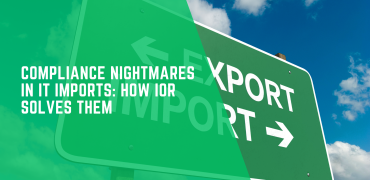In the dynamic landscape of international trade, Importer of Record (IOR) services have emerged as a critical component for businesses navigating the complexities of cross-border transactions. The role of the IOR, which encompasses ensuring compliance with local regulations, handling customs documentation, and assuming responsibility for imported goods, is becoming increasingly pivotal as global trade continues to evolve. This blog post delves into the future of IOR services, exploring the trends and predictions that will shape this essential industry in the coming years.
1. Technological Advancements
Digital Transformation
The digital revolution is transforming every sector, and IOR services are no exception. The integration of advanced technologies such as blockchain, artificial intelligence (AI), and the Internet of Things (IoT) is streamlining operations, enhancing transparency, and improving efficiency.
Blockchain Technology Blockchain technology promises to revolutionize the IOR landscape by providing a secure, transparent, and immutable ledger for recording transactions. This technology can mitigate risks related to fraud and discrepancies in documentation, ensuring a more reliable and trustworthy import process. Blockchain can also facilitate faster customs clearance by providing authorities with real-time access to tamper-proof records.
Artificial Intelligence and Machine Learning AI and machine learning algorithms are being employed to predict trends, optimize logistics, and automate routine tasks. These technologies can analyze vast amounts of data to identify patterns and provide insights, enabling IOR service providers to make informed decisions. AI-powered chatbots and virtual assistants can also enhance customer service by providing instant support and guidance.
Internet of Things (IoT) IoT devices, such as smart sensors and RFID tags, are being used to track and monitor shipments in real-time. These devices provide critical data on the location, condition, and status of goods, enabling IOR service providers to manage inventory more effectively and respond promptly to any issues.
2. Regulatory Changes
Evolving Trade Policies
As global trade policies continue to evolve, IOR service providers must stay abreast of regulatory changes to ensure compliance. Trade agreements, tariffs, and import restrictions can significantly impact the import process, necessitating a thorough understanding of the regulatory landscape.
Regional Trade Agreements Regional trade agreements, such as the United States-Mexico-Canada Agreement (USMCA) and the Comprehensive and Progressive Agreement for Trans-Pacific Partnership (CPTPP), are reshaping trade dynamics. IOR service providers must navigate these agreements’ complexities to capitalize on new opportunities and avoid potential pitfalls.
Tariff Fluctuations Tariff fluctuations can create uncertainty and impact the cost of importing goods. IOR service providers must monitor these changes closely and adapt their strategies accordingly to mitigate risks and ensure cost-effective import solutions for their clients.
Sustainability Regulations With increasing emphasis on sustainability and environmental responsibility, regulations governing the import of goods are becoming more stringent. IOR service providers must ensure compliance with environmental standards and sustainability regulations to avoid penalties and reputational damage.
3. Globalization and Market Expansion
Emerging Markets
The expansion of global markets presents both opportunities and challenges for IOR service providers. Emerging economies in Asia, Africa, and Latin America are becoming significant players in international trade, requiring IOR services tailored to these regions’ unique regulatory and logistical landscapes.
Asia-Pacific Region The Asia-Pacific region, with its rapid economic growth and increasing consumer demand, is a key focus for IOR service providers. Countries such as China, India, and Southeast Asian nations are driving trade volumes, necessitating a deep understanding of their regulatory environments and market dynamics.
Africa and Latin America Africa and Latin America are also emerging as important markets for international trade. IOR service providers must develop expertise in these regions to support businesses looking to expand their operations and capitalize on growth opportunities.
E-commerce Boom
The rise of e-commerce is revolutionizing global trade, with cross-border online sales increasing at an unprecedented rate. IOR service providers must adapt to the unique requirements of e-commerce, including fast-paced shipping, diverse product ranges, and the need for seamless returns processes.
Cross-border E-commerce Cross-border e-commerce presents unique challenges, such as varying customs regulations, tax compliance, and logistical complexities. IOR service providers must develop specialized solutions to support e-commerce businesses in navigating these challenges and ensuring a smooth import process.
Last-mile Delivery Solutions Efficient last-mile delivery is crucial for e-commerce success. IOR service providers are increasingly partnering with logistics companies to offer integrated solutions that ensure timely and cost-effective delivery of goods to end customers.
4. Risk Management and Compliance
Enhanced Risk Management
As global trade becomes more complex, the importance of robust risk management strategies cannot be overstated. IOR service providers must implement comprehensive risk management frameworks to identify, assess, and mitigate potential risks associated with importing goods.
Compliance and Due Diligence Ensuring compliance with import regulations is a fundamental aspect of IOR services. Providers must conduct thorough due diligence to verify that all necessary documentation is in place and that imported goods meet regulatory standards. This includes compliance with customs regulations, product safety standards, and intellectual property rights.
Supply Chain Resilience The COVID-19 pandemic highlighted the need for resilient supply chains. IOR service providers must develop strategies to enhance supply chain resilience, including diversifying suppliers, implementing contingency plans, and leveraging technology to monitor and manage risks.
Cybersecurity
With the increasing reliance on digital systems and data, cybersecurity is a critical concern for IOR service providers. Protecting sensitive information and ensuring the integrity of digital transactions is paramount.
Data Protection IOR service providers must implement robust data protection measures to safeguard sensitive information, including customer data, shipment details, and financial transactions. Compliance with data protection regulations, such as the General Data Protection Regulation (GDPR), is essential.
Cyber Threat Mitigation Proactive measures to mitigate cyber threats, such as regular security audits, employee training, and the use of advanced cybersecurity technologies, are crucial for protecting against data breaches and cyberattacks.
5. Customer-centric Approaches
Personalized Services
As the IOR industry becomes more competitive, providing personalized services is key to differentiating and building customer loyalty. Understanding the unique needs and preferences of each client allows IOR service providers to offer tailored solutions that enhance the customer experience.
Customizable Solutions Offering customizable solutions that cater to specific client requirements, such as industry-specific expertise or region-specific knowledge, can provide a competitive edge. Personalized services can include tailored compliance support, customized reporting, and flexible shipping options.
Proactive Communication Effective communication is essential for building strong client relationships. IOR service providers must maintain proactive communication with clients, keeping them informed about the status of their shipments, regulatory changes, and potential risks.
Value-added Services
In addition to core IOR services, offering value-added services can enhance the overall customer experience and provide additional revenue streams.
Consulting and Advisory Services Providing consulting and advisory services on import regulations, market entry strategies, and supply chain optimization can position IOR service providers as trusted partners for their clients. These services can help clients navigate complex regulatory environments and make informed business decisions.
Training and Education Offering training and education programs on import compliance, customs procedures, and risk management can empower clients to better understand and manage their import operations. This can lead to more efficient processes and reduced risk of non-compliance.
Conclusion
The future of Importer of Record services is shaped by a confluence of technological advancements, regulatory changes, globalization, risk management, and customer-centric approaches. As the global trade landscape continues to evolve, IOR service providers must adapt to these trends and predictions to remain competitive and deliver exceptional value to their clients.
Embracing digital transformation, staying abreast of regulatory developments, expanding into emerging markets, enhancing risk management strategies, and adopting customer-centric approaches will be key to success. By leveraging technology, providing personalized services, and offering value-added solutions, IOR service providers can navigate the complexities of international trade and drive sustainable growth in the years to come.
As we look ahead, the role of IOR services will become increasingly critical in facilitating seamless and compliant cross-border transactions, enabling businesses to thrive in the global marketplace. The ability to adapt and innovate will be the defining factor for IOR service providers in shaping the future of international trade.




